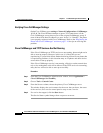
Chapter 7 Troubleshooting the Cisco IP Phone
Resolving Startup Problems
7-18
Cisco IP Phone Administration Guide for Cisco CallManager 3.2, Cisco IP Phones 7960/7940/7910
78-10453-04
Registering the Phone with Cisco CallManager
Registration with a Cisco CallManager server can only be successful if the phone
has been added to the server or if auto-registration is enabled. Review the
information and procedures in the “Adding Phones to the Cisco CallManager
Database” section on page 2-10 to ensure that the phone has been added to the
Cisco CallManager database.
To verify that the phone is in the Cisco CallManager database, use Device > Find
from Cisco CallManager to search for the phone based on its MAC Address.
Verify the MAC address to search for by pressing settings > Network
Configuration > MAC address on the phone.
If the phone is already in the Cisco CallManager database, its configuration file
might be damaged. Refer to the “Creating a New Configuration File” section on
page 7-21 for assistance.
Checking Network Connectivity
If the network is down between the phone and the TFTP server or
Cisco CallManager, the phone cannot start up properly. Ensure that the network
is currently up-and-running.
Verifying TFTP Server Settings
The Cisco IP Phone uses the TFTP server setting (settings > Network
Configuration > TFTP Server 1) to identify the Cisco CallManager server. If
this setting is incorrect, the Cisco IP Phone might continually cycle while
attempting to contact the identified TFTP Server.
If you have assigned a static IP address to the phone, you must manually enter this
setting. Refer to the “Configuring IP Settings” section on page 5-14.
If you are using DHCP, the phone obtains the address for the TFTP server from
the DHCP server. Check the IP address configured in Option 150. See
Configuring Windows 2000 DHCP Server for Cisco Call Manager on Cisco.com:
http://www.cisco.com/warp/customer/788/AVVID/win2000_dhcp.html
You can also enable the phone to use an alternate TFTP server (settings >
Network Configuration > Alternate TFTP Server). This is particularly useful
if this phone was recently moved from a different location, such as a test lab to a
production network.


















